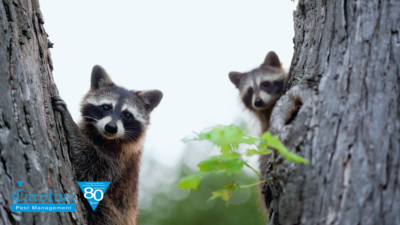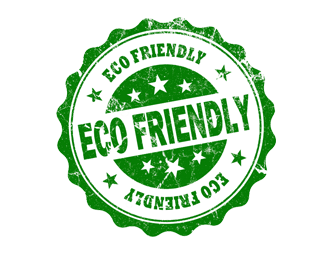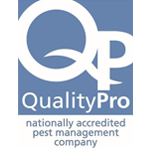One of the biggest challenges when dealing with raccoons is their comfort level. The animals have become so accustomed to being around humans that they don’t scare off easily. They aren’t too picky about where they make their dens either. You could end up stumbling upon a family of raccoons inside and outside of your home. One of the main concerns with raccoons is the amount of damage they can cause as they build their dens. Worse yet, raccoons carry potentially serious diseases such as roundworm and rabies. Carolina Pest Management is here to help with your raccoon problem.
Raccoon Damage to Your Home
We all know the image of raccoons scurrying through your garbage can, looking for food. That by itself is enough of a reason to raccoon-proof your home and its surroundings. However, there are some other ways that these pests can damage your home, such as:
- Destroyed Insulation – Like most furry pests, raccoons need to nest to raise their young. Unfortunately, if a family of raccoons gets into your attic, they can tear up the insulation to make room for new babies. Also, these critters are pretty hefty, so they can compress and dislodge insulation by walking around.
- Urine and Fecal Matter – Raccoons have to relieve themselves like all animals, and your home is the perfect place to do it, especially if they’re nesting in the attic. Urine can wear away wood and insulation, and raccoon poop can cause various health problems if germs and bacteria spread throughout your house.
- Food Destruction – Finally, raccoons can go after your garbage cans and other sources of food outside. For example, if you have a compost heap, they can tear through it and leave everything strewn about.
Diseases Raccoons Carry
Since raccoons don’t mind hanging around garbage and their own waste, they can develop a wide array of diseases and parasites. Unfortunately, some of these conditions can spread to humans and animals (such as pets). Here’s a quick overview of common illnesses that raccoons can cause:
- Rabies
- Pseudorabies
- Canine Distemper
- Leptospirosis
- Canine Hepatitis
Take $15 Off
Enjoy a discount off your initial general pest service when you sign up for a quarterly service plan.
How to Identify a Raccoon Problem

Raccoons are considered urban wildlife due to their intelligence and high comfort level around people. The animals are nocturnal, so you’re more likely to spot them at night as they raid garbage cans for food. Raccoons are so smart they have been known to even lift the lids off of trash cans to feast on the contents inside. If you do cross paths with a raccoon, their appearance is notable enough for you to identify on sight. They have a ringed tale and a distinct black mask around their eyes. Raccoons are about the same size as a small dog—weighing an average of 15 to 22 pounds and measuring 24 to 38 inches long.
Although raccoons prefer to be near water sources, they will make dens inside and outside of homes. Popular spots for raccoon dens include beneath decks and porches, within outbuildings, inside chimneys, and attic ceilings.
- Visible raccoon tracks: five long toes for front and back paws
- Fallen garbage cans with trash foraged
- Destroyed bird nests and damaged birdfeeders
- Damaged gardens
- Torn insulation and wiring
Our Charlotte Raccoon Inspection Process
The Carolina Pest Management technicians can zero in on the areas where they suspect raccoons are making themselves comfortable. We will check for damage to vents or the trim work to see if raccoons could’ve snuck in from these vulnerable areas. Uncapped chimneys can also attract raccoons to make their dens inside. Our inspection process includes checking for current damage caused by the nuisance animals. Your roof may have been damaged as raccoons have a tendency to rip off shingles and destroy roof vents as they try to find their way inside. Once in the attic, they’ll tear up insulation on the walls and inside the ductwork. The entire attic will smell awful as urine and feces stain the wood.
Our inspection is not limited to the interior of your home. We will look all around your yard to spot any raccoons. Although raccoons aren’t likely to dig holes, they can roll up turf and feast on gardens. The pests are particularly fond of sweet corn, but since they’re omnivores, they’re opportunistic eaters. After all areas of your home are inspected, we will develop an effective and safe treatment plan for permanent removal of the raccoons.
Charlotte Green Raccoon Treatment

Carolina Pest Management will always treat wildlife humanely and abide by all laws regarding their protection. We don’t believe in the use of dangerous poisons that present the potential to harm household family members and pets. Our multi-faceted treatment plan will involve exclusion of the animals and the use of live traps. Trapping and relocating is often the preferred method since the animals can return to the wild safely. Our Carolina Pest Management technicians have extensive knowledge of the type of bait to best attract raccoons and the type of traps available to secure them.
We don’t recommend using traps and repellents on your own. Although not particularly aggressive, raccoons will often fight back if they feel threatened. Their claws can cause serious damage to both yourself and your pets. Also, if they bite, they can transmit diseases.
Raccoon Maintenance
Getting rid of current raccoons is only one part of our service. Carolina Pest Management wants to prevent future infestations on your property. Certain repellents that work on other animals such as scarecrows and flashing lights aren’t always effective on raccoons. Due to the raccoons’ cleverness, they are likely to bypass the repellents after a couple of days. Instead, we suggest ways to eliminate their access to food and shelter.
Possible ways to rid your home and yard of raccoon attractants include:
- Seal entry points where raccoons can get in and out of your home
- Cap off chimneys and roof vents
- Keep all food indoors
- Securely fasten garbage can lids
- Install hardware ¼ inch mesh beneath porches and decks and around your garden
Frequently Asked Questions about Raccoon Removal Service
Will raccoons target swimming pools?
In many cases, homeowners will notice fecal matter from raccoons floating in their pools. This is a problem since the feces can carry deadly diseases. Your pool company may need to clean the water while also recommending a cover at night to stop raccoon access.
Are dogs effective at scaring off raccoons?
Sometimes dogs can frighten away raccoons by barking at the critters and chasing them. However, raccoons may retaliate and bite or claw at your pet.
Are raccoons difficult to remove?
Raccoons may require multiple removal methods. Depending on the circumstances, raccoons may not want to leave the area with exclusion techniques alone. For instance, raccoons breed in the winter and give birth in the early spring. They can have anywhere from one to six young in April and May and the babies stay with their mothers until about a year old. Due to the mother’s protectiveness, they may not venture far from their dens during this period.
Should I feed a raccoon?
Never, ever feed a raccoon you find on your property. Once they determine you can provide them with food, they are likely to return often and may start bringing friends along.
Should I be concerned if I see a raccoon during the day?
No. While it’s true that some raccoons are more active during the day if they’re sick, it’s not true of all raccoons. It’s fairly common for healthy raccoons that are not dangerous to be active during the day. The raccoon may be moving to a new place, visiting a garden, or simply looking for food to feed her young, which takes longer and can easily extend the raccoon’s active hours into the day. However, if you see a raccoon during the day that’s acting erratically, such as staggering around, not reacting to noise, is hurting itself, or has discharge from the eyes or mouth, call a pest or animal control professional immediately. These are signs of a sick raccoon that could be more dangerous to you and your family.
Raccoon Control | How Do I Get Rid of Resident Charlotte Raccoons?
Lifestyles of Resident Charlotte Raccoons From the viewpoint of resident Charlotte Raccoons, humans are among the best of all neighbors. Our luscious vegetable gardens offer what may seem like an endless food source. Those full bird feeders hanging by the split-rail fence look ready made for a hungry scavenger. Scraps tossed into the mulch pile. […]
Read More »Charlotte Raccoon Control Technicians
Handling raccoons ineffectively can put your home at risk of damage, even potentially exposing your family to diseases. Our expert technicians have training and experience with raccoons, the damage they cause to homes, and the potential health effects when humans are exposed. To ensure a safe removal process, we’ve developed multiple extraction strategies, each of which is used in different circumstances. All strategies avoid the concerns associated with the chemicals that raccoon exterminators used in the past. Instead of killing or harming the raccoons in your area, Carolina Pest Management technicians will trap and relocate the raccoons. Our professional service also includes maintenance recommendations to prevent raccoons from returning to your property.



